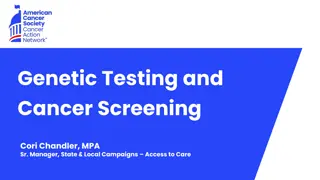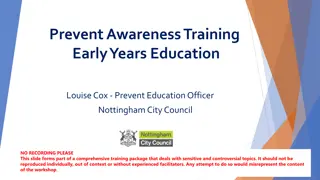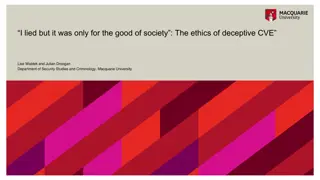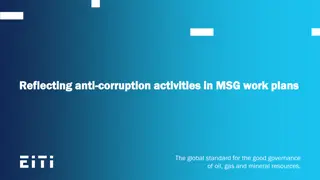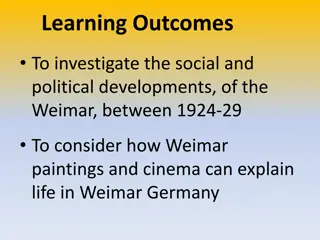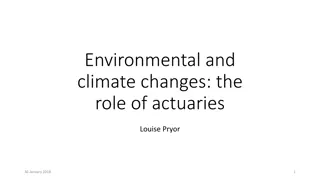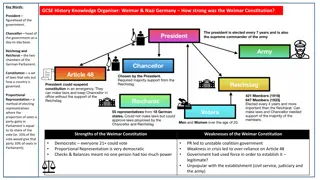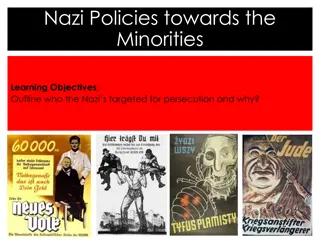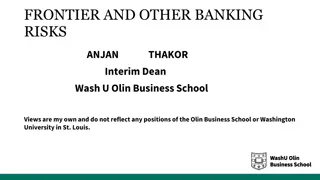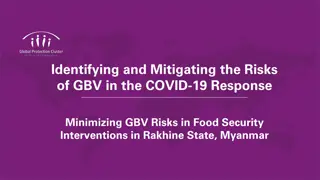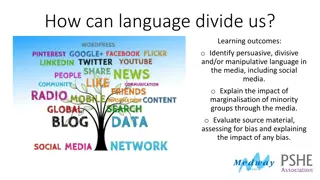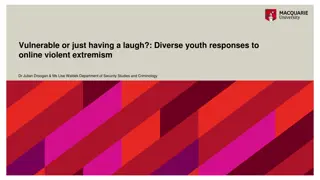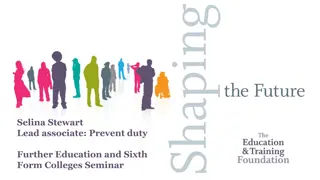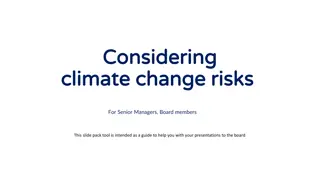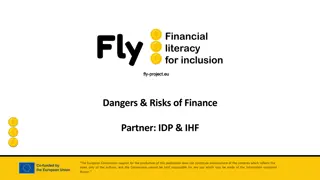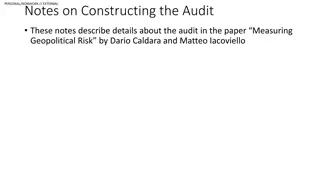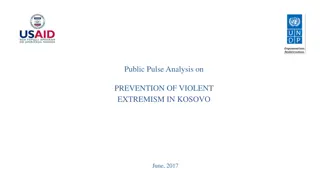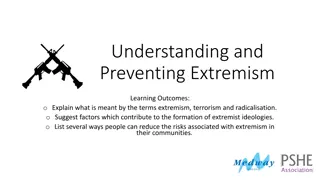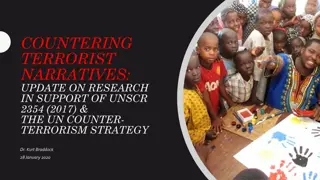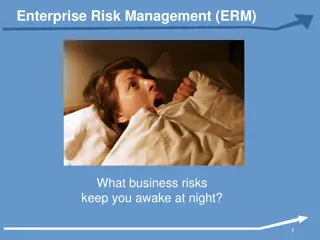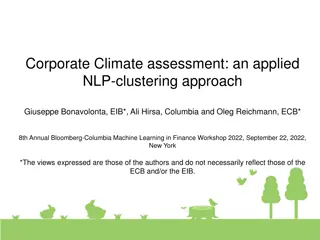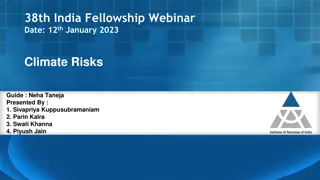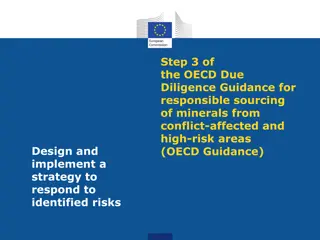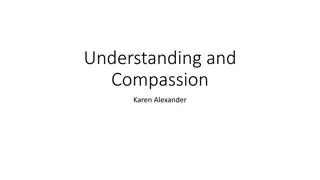Long-term Health Risks Among Children HIV-Exposed
Study comparing risks of hospitalization and chronic diseases in HIV-exposed uninfected children vs. population control in Montreal, Canada. Data indicates heightened risks in CHEU including bacterial infections, mortality, hospitalization, poor growth, psychiatric disorders, and neurological outcom
0 views • 25 slides
The Truth About Vaping: Health Risks and Environmental Impact
Vaping, seen as a safer alternative to smoking, comes with its own set of risks. While it can help adult smokers quit, it is not without consequences. Short-term effects like coughing and headaches, coupled with unknown long-term impacts, raise concerns. Furthermore, the environmental impact of disp
124 views • 23 slides
Understanding Joint Ventures in Business: Types, Advantages, and Risks
Explore the concept of joint ventures in business, including definitions, differences from partnerships, types, advantages like faster growth and increased resources, and risks such as lack of trust and divergent goals. Joint ventures allow entities to collaborate, share risks and profits, access ne
3 views • 14 slides
Antibiotic Adaptation in Renal Insufficiency - Dosage Adjustments and Risks
Understanding the importance of adapting antibiotic therapy in patients with renal insufficiency is crucial to ensure efficacy and minimize risks. This content covers various factors influencing antibiotic selection, dosing adjustments based on patient parameters, and the risks associated with inapp
0 views • 52 slides
Managing Power Platform Risk with an Environment Strategy by Frank Shink, Senior Power Platform Design Engineer at Ameriprise Financial
Frank Shink, a seasoned professional, delves into the risks associated with Power Platform, from development risks to cost risks, and offers insights on tools and strategies to combat these risks effectively. He emphasizes the importance of environments, DLP policies, and licensing strategies in mit
1 views • 20 slides
Status of Family Laws in India: Hindu vs. Religious Minorities
The family and personal status laws in India vary between Hindu law and those pertaining to religious minorities. While Hindu law has seen extensive reforms, discriminatory provisions still exist. In contrast, laws governing religious minorities have undergone fewer reforms, leading to greater inequ
2 views • 4 slides
Understanding Genetic Testing and Cancer Screening
Genetic testing involves the analysis of germline genes to determine the risk of developing certain cancers or passing on risks to offspring. It can provide valuable insights into cancer risks, help inform relatives about potential risks, but may have limitations and risks such as cost and insurance
0 views • 10 slides
Prevent Duty Training for Early Years Education Professionals
The Prevent Duty Training for Early Years Education Professionals aims to provide crucial information on the Prevent Duty and responsibilities outlined in KCSIE 2023. The training covers key aspects such as local risk factors, extremist groups affecting youth, recognizing signs of vulnerability in c
1 views • 30 slides
Deceptive CVE Strategies and Ethical Considerations in Countering Violent Extremism
Exploring the complexities of implementing online CVE programs to divert youth from violent extremist narratives, this article discusses the use of counter-narratives, ethical challenges of deception, and the importance of reflexivity in program design and implementation.
0 views • 13 slides
Enhancing Anti-Corruption Activities in Extractive Sector Work Plans
Reflecting on anti-corruption activities in MSG work plans is crucial for good governance of oil, gas, and mineral resources. The EITI provides guidance on addressing corruption risks, with a recommended three-step approach: assess risks, develop an activity plan, and monitor results. Step 1 involve
0 views • 11 slides
Critical Thinking in Islamic Methodology
Explore the concept of critical thinking in Islam, identifying key skills and understanding the importance of constructive criticism. Delve into the methodology of thinking in Islam that transcends superficial understanding, enabling individuals to distinguish between good and bad, correct and incor
2 views • 12 slides
Social and Political Developments in Weimar Germany (1924-1929)
The period between 1924 and 1929 in Weimar Germany witnessed greater political stability with the Social Democrats winning most of the votes, although they did not secure a majority. The election results show a decline in support for extremist groups like the Communists and Nazis. Factors contributi
1 views • 29 slides
Economic Crises Faced by Weimar Republic, 1919-1933
The Weimar Republic encountered significant economic challenges between 1919 and 1933, leading to chaos and a surge in extremist support. Major crises included hyperinflation in 1923 and the devastating global Depression starting in 1929. The Treaty of Versailles imposed reparations on Germany, whic
0 views • 24 slides
The Role of Actuaries in Addressing Environmental and Climate Changes
Actuaries play a crucial role in assessing and managing risks posed by environmental and climate changes, aiding the insurance industry in mitigating these challenges. They consider long-term risks with significant financial implications, such as physical, transitional, and liability risks. Actuarie
0 views • 20 slides
Challenges Faced by the Weimar Republic in Germany
The Weimar Republic in Germany faced various challenges between 1919 and 1923, including political polarisation, extremist uprisings from both left-wing and right-wing groups such as the Spartacists and Freikorps, economic struggles like hyperinflation, and constant fighting undermining its authorit
0 views • 13 slides
Nazi Persecution of Minorities: Targets and Rationale
The Nazis targeted various groups for persecution, believing in a racial hierarchy where certain races were deemed inferior. They aimed to eliminate those they considered undesirable, including Gypsies, black people, the mentally disabled, homosexuals, and more. The Nazis' actions were driven by the
7 views • 12 slides
The Assassination of Mahatma Gandhi and the Trial of the Conspirators
The assassination of Mahatma Gandhi on January 30, 1948, by a young Hindu extremist sent shockwaves through India. The trial of the accused conspirators, including Nathuram Godse and Narayan Apte, resulted in eight convictions, with Godse and Apte being hanged for the murder. The incident marked a t
0 views • 11 slides
Banking Risks and Responses in Today's Financial Landscape
Anjan Thakor, Interim Dean at Wash U. Olin Business School, discusses various banking risks such as tension between fiscal and monetary policies, cyber security, rising consumer indebtedness, war and geopolitical risks, and more. The article explores how these risks can become systemic and suggests
7 views • 7 slides
Identifying and Mitigating GBV Risks in COVID-19 Response for Food Security in Rakhine State, Myanmar
Rakhine State faces challenges of conflict, displacement, and restricted movement, with many relying on food assistance. Cash assistance implementation did not escalate GBV risks. The COVID-19 restrictions heightened the need for adjustments in programming, requiring monitoring of assistance changes
0 views • 5 slides
Understanding Artificial Intelligence Risks in Short and Long Term
This content delves into the risks associated with artificial intelligence, categorizing them into short-term accident risks and long-term accident risks. Short-term risks include issues like robustness problems and interruptibility, while long-term risks focus on competence and alignment challenges
0 views • 15 slides
The Impact of John Brown's Raid on Harper's Ferry in 1859
John Brown's raid on Harper's Ferry in 1859 was an attempt to incite a slave rebellion and abolish slavery. Brown believed in the righteousness of his cause, but his actions sparked national debate and differing reactions. While some saw him as a martyr for freedom, others viewed him as a radical ex
2 views • 9 slides
Understanding Language Division in Media Representations
Explore the impact of language in media on marginalization, bias, and divisive perspectives towards minority groups. Reflect on the portrayal of different groups such as teenagers, city bankers, and migrants, and consider how language influences societal divisions and extremist views. Evaluate the r
1 views • 21 slides
Understanding Youth Responses to Online Violent Extremism
Diverse youth responses to online violent extremism are explored in this research, aiming to understand how and why young audiences consume and produce such content. The study delves into how young people define and engage with online violent extremist content, shedding light on their emotional and
0 views • 13 slides
PREVENT Strategy Implementation in Sheffield Schools: Autumn/Winter 2015-16
Raising awareness of the PREVENT strategy in Sheffield schools during the Autumn/Winter term of 2015-16 is crucial for safeguarding and preventing individuals from supporting terrorism. The strategy emphasizes the duty of schools to address all forms of terrorism through various initiatives like wor
0 views • 16 slides
Understanding the Prevent Duty in Further Education and Sixth Form Colleges
The Prevent Duty is a statutory responsibility that applies to various education providers, including those not receiving public funding. It involves safeguarding learners against extremist influences, necessitating risk assessments, clear policies, and staff training. Exploiting vulnerable individu
0 views • 20 slides
Managing Financial Risks in a Changing Climate Environment
Assessing climate-related and environmental risks is vital for ensuring the safety and soundness of financial institutions. These risks include physical risk drivers like extreme weather events and transition risk drivers related to policy measures and technological changes. The complexity and uncer
0 views • 11 slides
Addressing Climate Change Risks: Guidance for Senior Managers and Board Members
This slide pack tool provides guidance on addressing climate change risks for senior managers and board members. It covers key messages such as understanding obligations and gaps, identifying climate change risks, exploring responsibilities, and implementing actions to address these risks effectivel
0 views • 11 slides
Understanding Financial Risks and Mitigation Strategies
Explore the concept of financial risks, learn how to identify and mitigate them, and improve your financial decision-making skills. This module covers definitions, typical risks, and strategies to safeguard your finances. Discover the four main clusters of financial risks and how to implement counte
0 views • 17 slides
Insights on Constructing Geopolitical Risk Audit
Details on constructing the audit for the paper "Measuring Geopolitical Risk" by Dario Caldara and Matteo Iacoviello are outlined. It covers the process of building the GPR index, designing the audit sample, and coding articles to identify geopolitical risks discussed in newspapers. The methodology
0 views • 17 slides
Public Pulse Analysis on Prevention of Violent Extremism in Kosovo
Public Pulse Analysis in June 2017 delves into Kosovans' perceptions of violent extremism, resilience of Kosovan society against extremist ideologies, and strategies for increasing resilience through institutional efforts. The study begins with an overview of citizen perceptions from previous years,
0 views • 16 slides
Understanding and Preventing Extremism: Factors, Risks, and Solutions
Explore the definitions of extremism and terrorism, factors contributing to extremist ideologies, ways to reduce risks associated with extremism, and key concepts to understand and prevent radicalization. Delve into the root causes of extremist activities, such as lack of identity, influence from vi
0 views • 12 slides
Advancing Counterterrorism Strategies: Research Updates and Evaluation Methods
Recent research and developments in countering terrorist narratives highlight efforts spanning from pre-radicalization to disengagement phases, emphasizing interventions to challenge extremist ideologies and promote critical thinking. Evaluation tools and recommendations, including the use of quasi-
0 views • 8 slides
Enterprise Risk Management (ERM) Strategies for Mitigating Key Business Risks
Enterprise Risk Management (ERM) is a crucial strategic discipline that involves prospectively identifying, managing, and mitigating risks to reduce uncertainties and ensure organizational objectives are met. Risk rankings, mitigation strategies, and lead roles are outlined in the SJIEMS 2017 ERM Re
0 views • 38 slides
Understanding Extremist Risks: Insights and Strategies
Explore the complexities of extremist risk through a lens of psychological and contextual analysis. Delve into the nature of terrorism, different types of terrorism, and the importance of robust risk assessment in preventing, pursuing, protecting, and preparing against terrorist activities.
0 views • 21 slides
Understanding the Risks of Cheap Natural Gas and Hydraulic Fracking
This introduction delves into the multifaceted risks associated with the exploitation of cheap natural gas and hydraulic fracking. Covering climate risks, economic consequences of petro-states, direct GHG risks, and local environmental risks, the content underscores the complex challenges and implic
0 views • 8 slides
Understanding Corporate Climate Assessment Using NLP Clustering
This work explores a novel approach in corporate climate assessment through applied NLP clustering, highlighting the relationship between climate risk and financial implications. The use of advanced techniques like BERT embedding for topic representation and clustering in corporate reports is discus
0 views • 33 slides
Understanding Climate Risks in India: Insights from the 38th India Fellowship Webinar
Explore the impacts of climate risks in India through the lens of physical and transition risks detailed during the 38th India Fellowship Webinar on January 12, 2023. Key topics include climate change interactions, liability risks, and risk management strategies for a sustainable future.
0 views • 37 slides
Responding to Risks in OECD Due Diligence Guidance
Develop and implement a strategic response to identified risks in accordance with the OECD Due Diligence Guidance for responsible sourcing of minerals. The process involves reporting findings to management, devising a risk management plan, implementing the plan, and assessing ongoing risks. Mitigati
0 views • 7 slides
Understanding Social Progress and Terrorism: Factors and Solutions
Exploring the socio-economic factors contributing to terrorism and hindering social progress, this content delves into the correlation between unemployment, state repression, violence, and terrorism. Key factors analyzed include weak state capacity, corruption, extremist ideologies, and social injus
0 views • 15 slides
Rabindranath Tagore: The Iconic Man of Letters and His Political Stand
Rabindranath Tagore, the Nobel Prize-winning poet, novelist, and painter, was a modernist humanist who criticized extremist nationalism. He founded Viswa Bharati University as a radical educational experiment. The context of his time, including the Jallianwala Bagh Massacre and the Swadeshi Movement
0 views • 15 slides






